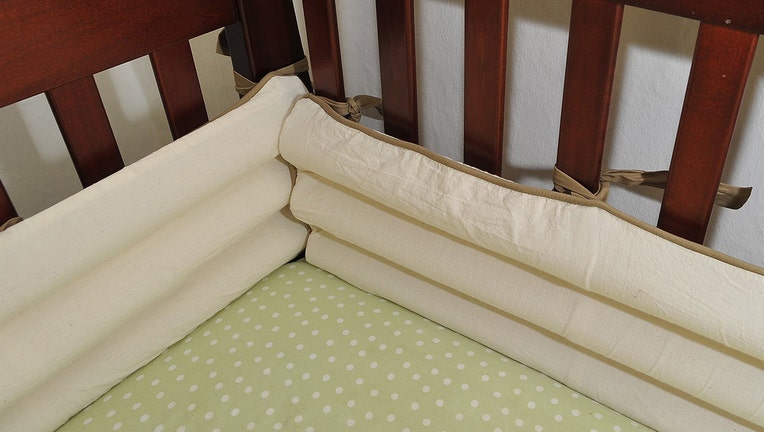Federal commission finalizes ban of inclined infant sleepers, crib bumpers

Photo of a crib bumper. (Credit: Gordon Chibroski/Portland Press Herald via Getty Images)
The U.S. Consumer Product Safety Commission (CPSC) unanimously approved the last two steps to ensure inclined infant sleepers and crib bumpers are no longer sold in the country because of potential harms.
Effective in November 2022, the Safe Sleep for Babies Act (SBBA) prohibited the sale of inclined sleepers for infants and crib bumpers, along with the manufacturing for sale, distribution or importation into the U.S., of such products.
The new rules were implemented to save the lives of infants while creating a safer marketplace for parents, according to CPSC.
On Monday, the commission approved two rules to finalize and codify bans on inclined infant sleepers and crib bumpers.
PHILIPS RECALLS NEARLY 13K BABY MONITORS FOR RISK RELATED TO OVERHEATING BATTERIES
In its final rule, "inclined sleeper for infants" is defined as a product with an inclined sleep surface greater than 10 degrees, which is intended, marketed or designed to provide sleeping accommodations for infant up to a year old.
The commission also defined a crib bumper as any material intended to cover the sides of a crib to prevent injury to any crib occupant from impacts against the side of the crib or to prevent partial or complete access to any openings in the sides of a crib to prevent a crib occupant from getting any part of their body trapped in any opening.
RECALLED FISHER-PRICE SLEEPER NOW LINKED TO ROUGHLY 100 DEATHS, CPSC SAYS
Included in the definition of a crib bumper are padded crib bumpers, supported and unsupported vinyl bumper guards and vertical crib slat covers. Non-padded mesh crib liners are not included in the commission’s definition.
In a press release, the CPSC reminds parents and caregivers the best place for infants to sleep is on a firm, flat surface in a crib, bassinet or play yard, adding that only fitted sheets should be in an infant’s sleeping environment.
The commission also said infants should always be placed to sleep on their back, and if a baby falls asleep in an upright position, the baby should be moved to a flat surface for protection.
When the two final steps came to a vote, the commission voted 4-0.

